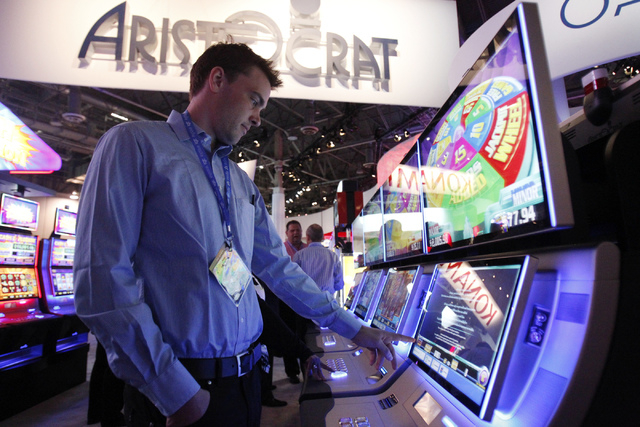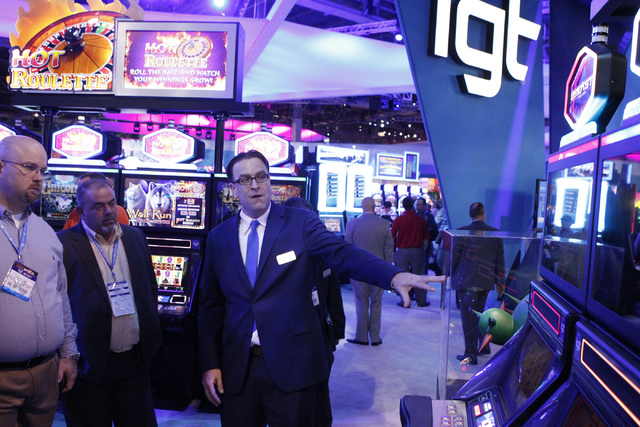Slot makers betting on video-game element to lure millennials
It’s clear the millennial generation — young adults born in the 1980s and 1990s — aren’t fond of playing slot machines.
They prefer “Angry Birds” over “Blazing 7s.”
New gaming regulations are headed for Nevada that will soon let gamblers do both.
The passage of Senate Bill 9 — backed by the Association of Gaming Equipment Manufacturers — allows slot machine companies to create games that contain a skill-based, arcade-style element. Slot makers believe the machines, which places the video-game component into a bonus round, will attract younger players.
Association Executive Director Marcus Prater called the measure a “monumental moment” for Nevada’s casino industry.
Meanwhile, analysts are encouraged by slot machine numbers reported by Nevada casinos over the past year. From June through March, statewide slot machine revenue increased in six out of the 10 months. At Strip casinos, revenue from the games increased in eight of the 10 months.
Slot volume — the amount gamblers wager on the machines — has increased six out of the past nine months statewide and seven out of the past nine months on the Strip.
The figure is a reverse from the past five years, where statewide slot volume increased just twice; 0.3 percent in 2011 and 0.1 percent in 2014. Slot machine revenue statewide also increased twice in those same five years; 1.5 percent in 2011 and 0.7 percent in 2012.
“We feel comfortable with the improving spending patterns on the slot floor,” Gaming Control Board Senior Research Analyst Michael Lawton said.
Researchers contend monthly increases in the amount gamblers wager on slot machines constitute a sign that middle-market customers are resuming their spending habits following the recession.
Those gamblers, however, are not millennials.
Alex Bumazhny, director of gaming, lodging and leisure research for Fitch Ratings Service, said the casino demographic age 35 and younger is more likely to participate in nongaming activities. When they do gamble, millennials favor blackjack tables over slot machines.
In a report for Fitch customers, Bumazhny cited an American Gaming Association survey that found a younger segment of casino visitors are more interested in playing skill-based games, such as fantasy sports and poker. They are also better acquainted with online gaming, including social casino sites.
“More of their money is going to less profitable amenities, such as food and beverage and entertainment,” Bumazhny said.
In Nevada, gaming has represented less than half of the casino industry’s overall revenue for 10 straight years. On the Strip, the divide is more pronounced, with casino revenue accounting for less than half of the total figure since 1998. In fiscal 2014, gaming amounted to 36.7 percent of the Strip’s overall $16.3 billion in revenue.
Newer slot machines, with more than just attractive bells and whistles, are viewed as a way to turn around casino fortunes.
Gov. Brian Sandoval signed the Association of Gaming Equipment Manufacturers’ bill May 21 after both legislative houses unanimously approved the measure.
But work on the regulations began before the bill made it out of the Senate. Prater said Gaming Control Board Chairman A.G. Burnett held meetings with AGEM to get the regulations moving forward. Another meeting was planned for last week.
“The chairman wanted to get ahead of the curve,” Prater said.
Observers wouldn’t be surprised if the proposed regulations were considered for final approval by the Control Board and Nevada Gaming Commission this summer.
“The regulations are the next logical step,” Prater said. “The game designers need to know the landscape. What this will all look like is up to the creativity of the game teams.”
Some slot manufacturers are ahead of the game.
Los Angeles-based Gamblit Gaming was licensed by Nevada a year ago and displayed its initial concepts at the Global Gaming Expo in October. The products contained a traditional slot machine with entertainment-style video games. Think “Wheel of Fortune” meets “Words With Friends.”
Gamblit CEO Eric Meyerhofer said the plan was to launch the company’s games in the United Kingdom to collect data on customer performance. Earlier this month, the company named Darion Lowenstein, a 20-year veteran from the video game industry, as chief marketing officer.
The new Nevada focus on skill-based slot machines might bring Gamblit to the market quicker.
Millennials prefer games with an element of skill, which is found on social game platforms. By introducing the concept to a slot machine, gamblers could achieve a higher payback percentage in a bonus round by having a proficiency in a video game skill element. Shooting down enemy airplanes or outracing other players in a road race would mean more bonus credits.
“This bill allows gaming manufacturers to use cutting-edge technology to meet the challenges prompted by a younger, more technologically engaged visitor demographic,” Sandoval said when he signed the bill.
The new emphasis on slot machines comes as online gaming is fading. Once lofty financial projections for a legal U.S. online gaming market have collapsed.
Just three states — Nevada, New Jersey and Delaware — have Internet wagering. Fitch said the states combined for revenue of $130 million in their first year, far below estimates that included $300 million in New Jersey.
Bumazhny isn’t ready to write off Internet gaming. Pennsylvania and California are considering legalizing the activity, but it’s early.
“Increasing social acceptance, technological advancements and political pressures to fill budget gaps will likely spur more states to adopt online gaming eventually,” he said. “But this will take time.”
By year’s end, we might have an idea of what the slot machine industry is planning for next wave of casino customers.
Howard Stutz’s Inside Gaming column appears Wednesdays and Sundays. He can be reached at hstutz@reviewjournal.com or 702-477-3871. Find on Twitter: @howardstutz.



















